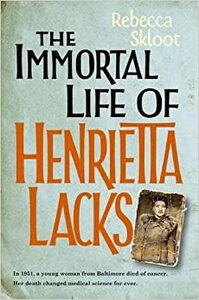Take a photo of a barcode or cover
challenging
dark
emotional
hopeful
informative
inspiring
reflective
sad
medium-paced
I loved this book, though at times it also broke my heart. I will never forget little Elsie. I will be forever grateful we will never know exactly what she suffered. Her image will stay with me for a very long time.
This is a story that explores the kinds of assumptions that drive research and medical practices, about the assumptions a society makes about the relative value of particular race, demographic group(s), and/or profession and how those assumptions can reverberate in the lives of real, living, breathing human beings. It's a story of a society wrestling with the implications of the inequalities it's created and in fact requires in order to thrive. It's also about a family and their love for and struggles with one another.
It's an amazing and beautiful book filled with amazing and beautiful and very real people.
This is a story that explores the kinds of assumptions that drive research and medical practices, about the assumptions a society makes about the relative value of particular race, demographic group(s), and/or profession and how those assumptions can reverberate in the lives of real, living, breathing human beings. It's a story of a society wrestling with the implications of the inequalities it's created and in fact requires in order to thrive. It's also about a family and their love for and struggles with one another.
It's an amazing and beautiful book filled with amazing and beautiful and very real people.
this is a great story-seen a lot of interesting interviews with the author lately
This book is truly one of the best books I’ve ever read. I didn’t know anything about HeLa cells, and reading this book made me laugh, cry, get angry, and every emotion in between. These are real people, mourning for a real person, trying to grapple with the reality of this beloved person’s cells belonging to everyone but themselves. Yes, I do believe they deserve compensation from her cells, but I also want Henrietta Lacks, and the black community during these times, to get recognition. I didn’t really know anything about what was happening to the black community medically during these times, except for the Tuskegee Experiments, and it’s horrifying. I wanted to hug members of the family, shake some of them, and yell at the top of my lungs.
This book was so well-written. It never felt as long as it was because it is so engaging. These are real people, not just people that things happened to. Skloot did an excellent job really personalizing everyone. I would recommend this book to anyone. It was just so well-done. I want to say so much more, but I don’t even know how to say how this book has left me feeling. My heart feels full but also sad. I wish I could give Deborah a hug. Just a truly incredible narrative.
This book was so well-written. It never felt as long as it was because it is so engaging. These are real people, not just people that things happened to. Skloot did an excellent job really personalizing everyone. I would recommend this book to anyone. It was just so well-done. I want to say so much more, but I don’t even know how to say how this book has left me feeling. My heart feels full but also sad. I wish I could give Deborah a hug. Just a truly incredible narrative.
Loved so much of this. Towards the end of the book there’s a lot about the ethics is cell use/making money/capitalism and science/etc, but no real conversation/acknowledgement around US healthcare being denied to millions constantly with lethal results/especially folks like the Lacks - it’s an enormous oversight in an argument about the “ethical responsibility” of the general public to provide cell tissue/etc for research without looking for money or ownership
challenging
dark
emotional
informative
reflective
sad
medium-paced
I'm not sure this is quite the book the author expected to write, but it is compelling.
It's interesting to learn more about the back story of HeLa cells and read about all the ethics of it, but I do not care for the author's writing style. She keeps padding herself on the back for getting this story out and what she all had to endure to get it. Morever, I felt she put the Lacks family in some bad light with her writing style.
Several fascinating and important topics crammed together in a book that lacked cohesiveness and direction. The repetitive and laborious writing buried any of the potential impact the story could've had.
challenging
dark
emotional
informative
inspiring
sad
medium-paced





